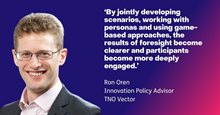Space as a strategic asset: how the Netherlands can safeguard its autonomy and earning capacity
The Netherlands is internationally renowned for its ability to organise limited space intelligently and create attractive living environments. Yet, at a time when Europe seeks to enhance its strategic autonomy, physical space is increasingly becoming a strategic asset. How we allocate our scarce space directly affects our earning capacity, independence, and position within Europe, as well as liveability. In this reflection, I explore why TNO Vector plays a key role in this context.
Space as a productive factor
The Draghi report on European competitiveness emphasises that Europe must become more competitive by investing in key technologies, energy infrastructure, and innovation. Yet all these ambitions start with something fundamental: space. Without space for energy hubs, data centres, logistics nodes, and housing, we cannot fulfil our role in European value chains. Space is therefore not a background variable, but a critical productive factor for economic success.
Strategic autonomy begins with spatial choices
Strategic autonomy means being less dependent on others for vital needs such as energy, food, defence, and data. For the Netherlands, this is concrete:
- Energy: Space for offshore wind, solar parks, and energy storage makes us less reliant on fossil imports.
- Food: Innovative and efficient agriculture requires smart spatial integration to maintain our position as a European food producer within regulatory frameworks.
- Defence and security: Training grounds, logistics corridors, and protected infrastructure all require physical space.
By deploying space sparingly yet strategically, we can better safeguard our autonomy.
Space as a prerequisite for earning capacity
The Draghi report advocates “investment-led growth”. For the Netherlands, this means that innovation clusters—from Brainport to Rotterdam and Energy Valley—can only flourish if there is sufficient space for expansion and connection. Housing and infrastructure are also crucial: without enough homes, the labour market stagnates, and without good infrastructure, mobility, and an attractive, healthy living environment, we lose our appeal to businesses and talent. Space is thus not a passive factor, but a condition-setting instrument for economic earning capacity.
Spatial policy as a strategic instrument
Dutch earning capacity depends not only on innovation and capital, but also on spatial policy:
- Concentrating economic activities around strong clusters boosts productivity (as Draghi emphasises).
- Combining functions - energy, nature, mobility - prevents conflicts and accelerates transitions.
- Protecting vital space prevents lock-ins and costly corrections in the future.
- A healthy living environment reduces disease burden and increases labour productivity.
The unique role of TNO Vector
Where planning agencies such as PBL, CPB, CBS, and SCP mainly analyse, monitor, and calculate policy options, TNO Vector, together with colleagues from TNO, additionally offers:
- Applied knowledge and technology - directly link spatial strategy to technological and innovative solutions, such as new energy technologies, digital models, and system integration.
- Practice-oriented scenarios - we develop and test integrated scenarios, for example for the integration of hydrogen networks, offshore wind, or new mobility concepts.
- Linking policy and implementation - we can provide governments and businesses with insights into the distribution and broad welfare effects of policy using data and models (for example, with the Lelylijn) and reflect on implemented policy.
- Neutral and independent partner - Our position between government, business, and academia enables us to build bridges between parties and sectors.
Thus, TNO Vector acts not only as a knowledge provider but also as a strategic innovator and connector, precisely at the intersection where societal challenges, spatial choices, and technology meet.
Reflection and call to action
Physical space is not something that can be taken for granted, but rather a strategic asset that determines our autonomy and earning capacity. Those who use space wisely increase national autonomy and strengthen economic earning capacity. The question is therefore not whether we should use space strategically, but how. What priorities do we set, and do we dare to stick to them? This is a task for all of us – and an opportunity for TNO Vector to provide direction.


